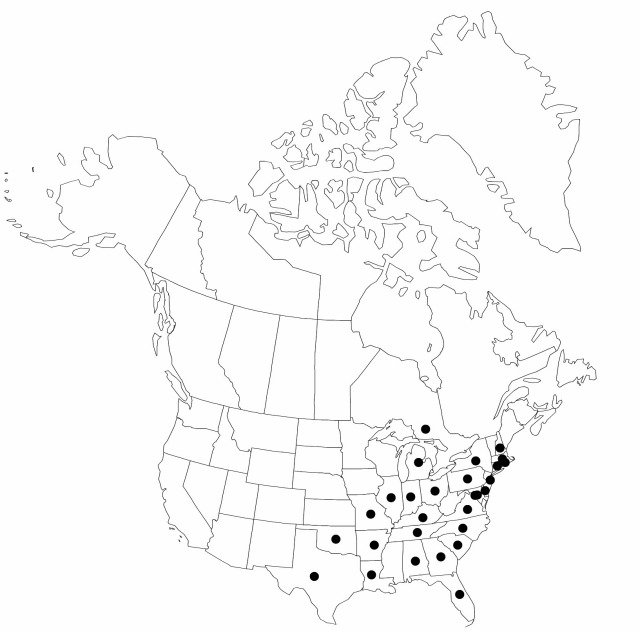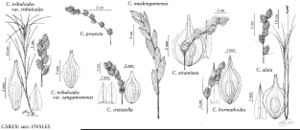Carex alata
Ann. Lyceum Nat. Hist. New York 3: 396. 1836.
Plants densely cespitose. Culms 30–140 cm. Leaves: sheaths adaxially conspicuously green-veined nearly to collar, narrow hyaline band or sharp Y-shaped region at collar, adaxially firm, sometimes papillose, summits U-shaped; distal ligules 2.8–8 mm; blades 3–7 per fertile culm, 11–50 cm × 2.5–6 mm. Inflorescences dense or open, pale green or brown, 2–6.5 cm × 7–20 mm; proximal internode 3–13 mm; 2d internode 4–10 mm; proximal bracts scalelike with bristle tips shorter than inflorescences. Spikes 3–11, distant, distinct, ellipsoid to ovoid, 6–20 × 4–9 mm, base rounded or short-acute, apex broadly acute to obtuse. Pistillate scales white-hyaline or tan, with green midstripe extending to tip, lanceolate, 2.8–3.5(–3.8) mm, shorter or longer and much narrower than perigynia, apex firm, acuminate or awned to 0.8 mm. Perigynia ± spreading, light or golden brown, faintly 3–8-veined on each face, obovate, flat except over achene, 4–5.5 × 2.5–3.8 mm, 0.4–0.5 mm thick, margin flat, including wing 0.8–1.5 mm wide; beak light brown at tip, flat, 0.85–2.2 mm, ciliate-serrulate, abaxial suture with light brown margin, distance from beak tip to achene 1.8–3 mm. Achenes oblong, 1.7–2 × 0.9–1.1 mm, 0.3–0.4 mm thick. 2n = 74.
Phenology: Fruiting late spring–mid summer.
Habitat: Peaty shores, marshes, wet thickets, woods
Elevation: 0–400 m
Distribution

Ont., Ala., Ark., Conn., Del., D.C., Fla., Ga., Ill., Ind., Ky., La., Md., Mass., Mich., Mo., N.H., N.J., N.Y., N.C., Ohio, Okla., Pa., R.I., S.C., Tenn., Tex., Va.
Discussion
Selected References
None.
